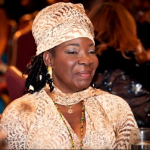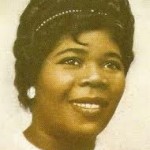
Cedella Marley
STORY: DOREEN ST. FÉLIX
PHOTO: BRAD OGBONNA
The sound of Cedella Marley‘s name bears the double weight of matrilineal and patrilineal memory, as if her parents had arranged her name with rhythm and acoustics in mind. It’s known that in 1967, in Kingston, Jamaica, a young Bob Marley named his first child after one of his own great mentors: his mother. Forty-eight years later, Cedella Marley walks across the living room floor of her home in Miami, Florida, to retrieve a letter penned by her grandmother, née Cedella Malcolm. Cedella’s eyes are perpetually bright—she eats all organically and begins each day with a grueling exercise routine—and she speaks with a decisiveness that is stern and inspired. “She wrote this to me two years before she passed, in 2006,” Cedella says. The first woman to have the name Cedella Marley expresses a kinship that began with biology but that matured in a deeper, shared womanhood: “I’m writing to let you know how I feel. You are my role model. Ever since you were born. That’s why your Dad found it in his heart to name you after me, my first G.D. [granddaughter]. We are one of a kind.”
The letter lives behind glass. Cedella’s home, which she says took over eight years to build, is a museum to her extended family. Framed photos line every surface of her dim, earthy parlor. Cedella points out famous faces that she knows I must recognize, some of whom are her business partners. On the ceiling, a trompe l’oeil painting depicts three cherubs encircling a stern-faced lion. “They represent my sons,” she says. The exacting business and creative mind behind the successful Marley family brands looks up at the tableau with a small smile. After our talk—brief yet revelatory—it is clear who the lion symbolizes.

“EVERYBODY FOREVER WILL KNOW THE NAME MARLEY. WHY NOT MAKE SURE I’M THE ONE OVERSEEING THAT?”
Her eighteen-year-old son Skip is taking notes on the kitchen table next to a cardboard diorama of a nucleus. Skip is a musician, and he released his expertly sweet first single, “Cry To Me,” in April of 2015, on the family’s label, Tuff Gong International. There are strains of his Uncle Damian’s signature style in his precocious warble. Cedella talks of his potential success as an inevitability, and the family track record is a good indicator. “You need to go to those music writing classes with your Uncle Steve,” Cedella calls over her shoulder. She’s referring to Stephen Marley, her younger brother, a celebrated songwriter and musician in his own right. Skip nods.
She guides me to a sun-bathed hallway to visit the pristine snow white German Shepherds, Lee and Molly, who’ve just been returned from the vet by her husband, David Minto. “He’s got a screw face because he’s a teenager. I smile a lot,” Cedella says of Skip. “I get my screwface from you!” Skip calls from the kitchen table. For over twenty years, Cedella and her siblings Steve, Sharon, and Ziggy performed as the Grammy-award winning group Ziggy and the Melody Makers, she as vocalist. Cedella was 23 when she became the CEO of Tuff Gong International, the record label started by the Wailers in 1965. Under her leadership, Tuff Gong became one of the top global distributors of music produced in the Caribbean, striking up distribution deals with mega-conglomerates like Universal, Disney, and Warner Music Group.
Converting a legendary name into a brand—as Cedella has done for the five companies that exist under the Marley moniker—can sometimes be flattening, even kitschy. Cedella knows this keenly and is shrewd—never skittish—about embracing the Marley name as a product. “Everybody forever will know the name Marley. Why not make sure I’m the one overseeing that?” she says. Under Cedella’s leadership, the family name has spread beyond the famous father’s image, into a number of family businesses including coffee, cannabis, and music distribution, amongst others. As well, her personal work has spanned music, fashion design, authorship, philanthropy, and entrepreneurial ventures. “Cedella learned to run a business on the ground at a very young age,” says Myshjua Archibald, an employee at Tuff Gong.
We spoke to Cedella about what it means to be a boss, the shift of the Marley name from patriarchy to matriarchy, and what her father’s example taught her about men.

“SINGING WAS FINE FOR A WOMAN. BUT ONCE I WANTED TO BE THE NEXT GENERATION LEADER, THEY ACT LIKE, ‘WHY ARE YOU SITTING BEHIND THIS DESK?”
You became the CEO of Tuff Gong in your early twenties. Black female CEOs are a rarity, even more so at such a young age. Were you apprehensive accepting the post?
When we first went down to Tuff Gong in the early ’90s, it was surreal. I didn’t even know who was running the label at that point, but I knew I was supposed to be. Even some of my dad’s friends and musician friends came down there and basically told me to get out. But I was like, “You get out.” Singing was fine for a woman. But once I wanted to be the next generation leader, they act like, “Why are you sitting behind this desk?”
Were the executives and artists at Tuff Gong mostly male at the point?
It was. But men will always listen you know, it just depends on how you talk to them. We got a lot of people to listen. But I also came with my own team. Some young, fresh, beautiful women: Myshjua and Lois Rice [Marley’s assistant] came from Los Angeles, and Marie came from Miami. Basically we didn’t know what we were doing, but we knew it couldn’t be that hard. I told everyone to buy How to Run a Record Company. We did it old school, too, like how Berry Gordy ran Motown. That was one of the books we read, [Gordy’s] To Be Loved.
You get the talent. You groom them. You give them voice lessons. You teach them how to dress. You teach them how to conduct interviews. We really turned the industry on its head. Jamaican music was getting weird twenty years ago. It wasn’t music anymore. It was noise.
Are there any artists you’re referring to in particular?
Back then? No. They were nameless and faceless. Just so whack. And then after I had my first child, I didn’t need to be in Jamaica anymore to run the company. At that time, we had become the number one distributor for Universal. Then we later acquired deals with Warner and Disney. I miss it, though.

Are there plans for you to return to doing that work in Kingston?
We’re doing it little by little. Marie is back there—she was one of the originals—she’s doing the Bob Marley Museum too. Skip is bringing us back more.
When the launch of Marley Natural was announced in 2014, you emphasized the connection between creative inspiration, especially with regards to your father’s use of the herb, and shrewd business strategy. You’ve been instrumental in expanding the copyright of your father’s image. Do you see the Marley brand as a method of controlling a family legacy against larger forces?
Daddy was my first teacher in building your brand. He was a businessman. He pressed his own records, printed his own t-shirts, sold his own merchandise on tour. I think at the time he was the only Jamaican artist doing that. He was my first business lesson. And then Mommy, of course. Her having to take the reins after 1981. Watching her go for it with not really any support. You can run a successful business and be a wife.
Do you still work with your mother?
I do. I mean, I work for her. [laughter] I work for all of them. I have like ten bosses in my family and I have to deliver.
Though your father is viewed by most of the world as an icon, the 2012 documentary Marley depicts your father candidly. You yourself describe him as being cold, a disciplinarian, even competitive with his children. Do you feel at odds reconciling that reality with the world’s extremely benign picture of him?
When I saw the documentary, I said, “Why did I let that out?” You know when you’re being asked questions, you just respond without thinking all the way. But he’s not stern. He wasn’t stern. The funny thing is, he wasn’t the disciplinarian, that was my mother. He couldn’t stand to see that. My father would always be the one to tell me, don’t let anybody change you, don’t let anybody shush you. He was very protective. But by his actions, he also taught me what I would never accept from a man.

Have you talked with your mother, Rita Marley, about your father’s treatment of her during their relationship?
No. It’s funny, when you’re teenagers in love, it’s a love I would never understand. The only love I could have like that, where I’m that forgiving, is with my children. It would never be with a man. I say sometimes, I’m no Rita Marley. Hats off to her. She stuck with her man through thick and thin. She took her vows very seriously. You have to be careful of those vows.
Aside from your work with Tuff Gong and the Marley Brands, I know you head fashion and philanthropic projects, specifically geared towards uplifting Jamaican girls. You’re the ambassador to Jamaica’s Women’s Soccer team, The Reggae Girls. You collaborated with PUMA to design the 2012 Olympic costumes for the Jamaican Track and Field team. Is that a space for you to do work outside the expectations of your family name?
I’m not afraid to explore what I think is my fun side. Writing children’s books, starting fashion lines. As a matter of fact, we launched Harambe early this year at Caribbean Fashion Week and that was in honor of my mom. It was all African prints, but still with that modern, edgy feel in the cuts. The Reggae Girls, it’s a good thing you ask me this question. One of them got a Rhodes Scholarship. Sharona Forrester. We were actually having the discussion yesterday. There are so many successful women in Jamaica that run their own businesses, who work in the government. Why is it so hard for me to get them to support this program? These girls are going out there and they’re representing their country. We get Facebook likes now and then but not real support.

Do you have any guesses as to why women might be hesitant to support these endeavors?
Because “that’s not what girls do.” The cultural thing. To see, it’s really still annoying. It’s like, come on. They’re girls. What’s more empowering than going to the World Cup and playing a sport you really love. It’s been challenging. The homophobia, they don’t like the butch girls. I love them. I think they’re beautiful. We’re still trying to get funding. People shut doors down in our face. You’ll never forget when that happens.
Skip’s started to release music. Just looking at him today, wearing a t-shirt with his grandfather’s face on it, the physical resemblance is uncanny. Do you think he or your other sons, Soul Rebel, 21, and Saiyan, 11, are interested in taking up the family brand business, too?
That’s just the tip of the iceberg. Skip is self-taught everything, but still we bring in the experts because you can only take yourself so far if you’re really serious about your craft. Now he’s a one-man show. Very grounded. Since Soul Rebel left for college, Saiyan is Skip’s punching bag and his best friend. Saiyan loves music but he’s 11 and focusing on just being a kid for now.
You are named after your grandmother. You work with your mother on many endeavors, artistic and otherwise. The Marley name is more often tethered to your father and your brothers, but there seems to be an essential strength to the Marley women, one that propels the family business forward. How would you name your feminism, especially as a woman of the Jamaican diaspora?

The women who come out of the Caribbean? We’re the strongest breed. We do it all. If your man not around, they go to work, them going to make sure you go to school. They’ve always been in control. Submissive in some areas. Tactically. Someone told me the other day, people shouldn’t go to hard on men in Jamaica for cheating because the ratio is 7:1. And I said, ‘That was a fucking song’. You heard that in a reggae song. “Seven woman to one black man.” It’s not fact. When you get in your teen years and they’re in abusive relationships, you think, why are you staying? You know that old saying. ‘You don’t have no tree growing pon your face.’ But it was like, no, he loves me and my mom tells me if he’s not beating me, he doesn’t love me.
Culturally, we’re still back in the ’60s. We talk a good talk but the actions don’t back them up. That’s why I really wish I had girl children. They would be monsters, little monsters. [Laughs] They would take over the world


You must log in to post a comment.